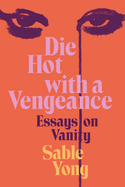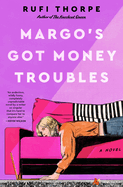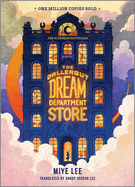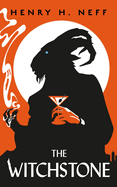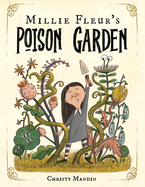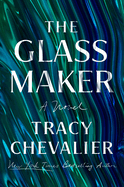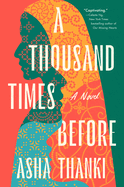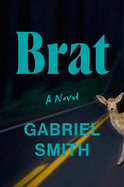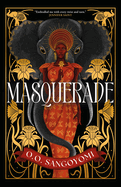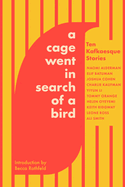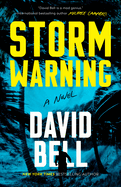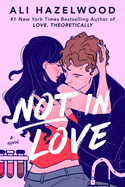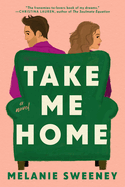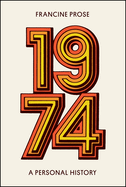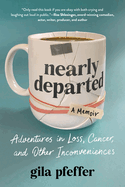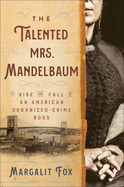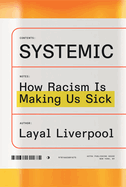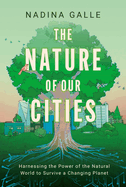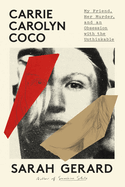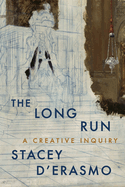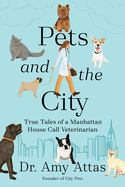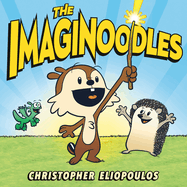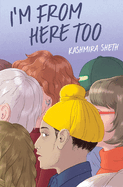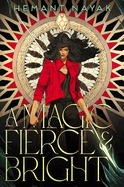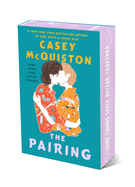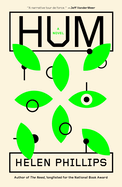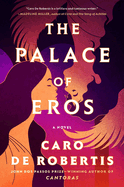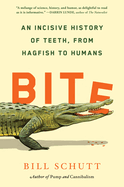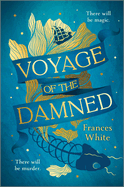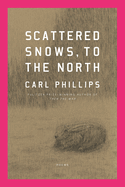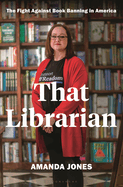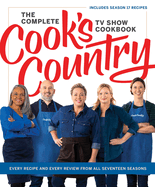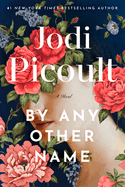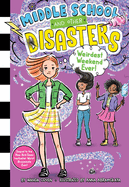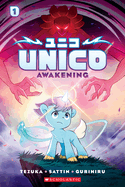Friday, July 12, 2024
Highlighted in this week's issue, Die Hot with a Vengeance is the "charmingly subversive and often hilarious debut" by Sable Yong, who pulls back the curtain on beauty culture in her essay collection about vanity; and Margo's Got Money Troubles by Rufi Thorpe is a "wickedly smart story" about a college student faced with an unplanned pregnancy that's "going to make some serious noise." Plus, with Kindred Spirits: Shilombish Ittibachvffa, Leslie Stall Widener creates a "moving, uplifting picture book about the power of empathy"; and Millie Fleur's Poison Garden is Christy Mandin's "dare-to-be-different picture book" that takes "a spirited swipe at lazy-brained conformity."
For The Writer's Life, children's book authors Megan McDonald and Anna Humphrey discuss the ingenious kind of humor they both brought to creating bunny characters with a mischievous edge.
Margo's Got Money Troubles
by Rufi Thorpe
Sometimes, a simple review feels insufficient. Where are the skywriters, the megaphones? In the case of Margo's Got Money Troubles by Rufi Thorpe (The Knockout Queen), it may be more via shelf-talkers than carnival barkers, but rest assured: this novel is going to make some serious noise. Aside from its excellent pacing and fascinating character work, this book is terrifically smart and plays with perspective through the indelible voice of Margo, a college student surprised by an unplanned pregnancy (the product of a relationship with her married English professor) and an unexpected decision--to become a mother. "I did not have good reasons," Margo explains. "I just wanted that baby. I wanted it more than I'd ever wanted anything." When everything starts to crumble, as of course it must, Margo turns to OnlyFans and the live-in support of her ex-professional-wrestler father, Jinx.
Thorpe uses these elements to execute a brilliant exploration of what is real and what is fake, how the world sees us and how we see ourselves, and what it means to try to control the narrative. It's an exchange on OnlyFans that produces this question: "When you fall in love with a book, is it the character or the author you're falling in love with?" Margo argues that it might be both, but agrees when her fan notes that "only one of them is real." "And the fake one is the only one you get to actually know," she adds. Whether it's Rufi Thorpe or Margo, readers will fall in love with Margo's Got Money Troubles. --Sara Beth West, freelance reviewer and librarian
Discover: Rufi Thorpe shines in this wickedly smart story of single mother Margo and how far she will go to provide for her son and discover who she wants to be.
The Dallergut Dream Department Store
by Miye Lee, transl. by Sandy Joosun Lee
With The Dallergut Dream Department Store, Miye Lee explores the nature and power of dreams, the possibilities created by choosing them, and human nature itself. Whimsical and sweet, this debut novel translated from Korean by Sandy Joosun Lee will leave any reader musing and looking forward to a good night's rest.
Penny is terribly excited to interview at the Dallergut Dream Department Store, the crown jewel in a town devoted to sleepers' needs. She has studied the mythology and history, but meeting Dallergut himself is intimidating. However, he turns out to be nothing but nice, forgiving her learner's errors and prioritizing the sale of the right dream to the right customer, even over profits. Penny fangirls over the greatest dreammakers, whom she gets to meet in her new job: Nicholas, who specializes in seasonal dreams; Babynap Rockabye, who creates conception dreams; Maxim, who does surprising work in a dark back-alley studio; and Bancho, who cares for animals.
Penny is an innocent, wide-eyed disciple of Dallergut and his good works, as well as the celebrity dreammakers. Through her perspective and her refreshing tone, readers encounter an appealing, absorbing, imaginative world with rules for who designs experiences for whom. In her translator's note, Sandy Joosun Lee calls The Dallergut Dream Department Store "a story that is both fun and deep... unpretentious yet full of life." The pleasing tale, while simple on its surface, asks questions about self-determination and the mysterious power of nighttime imaginings to impact one's daily, "real" life. With a Calm Cookie or a Deep Sleep Candy, or just the right dream, all things are possible in Lee's captivating world. --Julia Kastner, librarian and blogger at pagesofjulia
Discover: Sleepers shop for dreams at a very special department store, where dreams may come true not only for customers but for employees as well.
The Glassmaker
by Tracy Chevalier
This transporting story of love and struggle spans the 15th century to the 21st, offering a window into the intrigues of Venetian glass and the families who make it. The Glassmaker follows Orsola Rosso, a fiery young woman with a sharp tongue and dreams of being a glassmaker in a time when the craft is an exclusively male space.
The novel opens in Renaissance Italy, when Orsola is a young girl. Her father dies in an accident, leaving her headstrong and impulsive brother, Marco, to lead the family's workshop. This is the first of many trials for the Rosso family, which endures uncannily through centuries, from the Black Plague through both world wars. Venice and its surrounding islands exist in a kind of time bubble, a fascinating premise that allows for a high-speed history lesson. Readers will learn about the rise and decline of Venetian glass while being swept up in Orsola's story.
Tracy Chevalier (Girl with a Pearl Earring; Remarkable Creatures) impressively imagines a character who lives through vast historical and cultural changes, conveying not only how her perspective would naturally shift but also the habits and views she might hold. Orsola is both admirable and flawed, fully rendered in three dimensions.
At the center of the novel is the idea of making art that matters--and endures. Orsola and her family value artistry and the creation of new, unique glass pieces. For fans of thoroughly researched and immersive historical fiction, The Glassmaker is a moving rendering of Venetian history, the allure of art, and a life fully lived. --Carol Caley, writer
Discover: This transporting story of love and struggle spans centuries as it follows a young woman who becomes a glassmaker, the intrigues of Venetian glass, and the families who make it.
A Thousand Times Before
by Asha Thanki
Asha Thanki's powerful debut novel, A Thousand Times Before, weaves together a complex family saga with the 20th-century history of India and Pakistan. As the novel begins, Ayukta sits down with her wife, Nadya, to address the question of whether to have a child. She confesses she has avoided the conversation, and shares the reason why: the women in her family pass down a tapestry that gives each chosen recipient access to their ancestors' memories.
The narrative delves into her grandmother Amla's peaceful early life as an only child in Karachi, then her devastation when her mother travels to a family wedding in Delhi and is caught up in the riots preceding the 1947 Partition. Arni, the impulsive but talented second daughter of Amla, inherits the tapestry and later immigrates to New York City as a student to build a life in a new, cold country far away from everything she has known. Ayukta speaks, too, of her own struggle to accept the tapestry and its gift, her deep love for the women she comes from, and the magic and burden of their memories. In unspooling their stories, she connects their hardships, their heartbreaking losses, and their enduring courage to her present-day experiences.
Thanki's narrative brims with sensory detail, and she writes evocatively of Amla's loneliness, and the difficulty of bridging the gap caused by distance and new experiences. Evocative, sweeping, and intimate, A Thousand Times Before explores Indian politics, the different ways to love a person, and the complexities of family: what we inherit, what we build for ourselves, and what we choose to keep. --Katie Noah Gibson, blogger at Cakes, Tea and Dreams
Discover: Asha Thanki's luminous debut novel traces the multigenerational history of an Indian family through a tapestry that allows women to access their ancestors' memories.
Brat
by Gabriel Smith
Gabriel, the titular brat, is down and out in about every way, including his relationship status, his job, and how he's perceived by his family. After the death of his father, Gabriel inhabits the family house to ready it for sale. As in many gothic tales, the place holds more secrets than answers: the home decays in parallel to the protagonist's body, which has begun to slough sheets of skin. Gabriel finds writing by his father and his mother, writing that changes every time he reads it. There is a man in a deer suit outside who either loves gardening or wants to do him harm; neither Gabriel nor readers know which. The protagonist unravels, questioning reality at every turn. What is fact and what is fiction, and maybe more importantly, what is a threat and what is simply odd? Gabriel Smith is skillful, giving readers the story of a quixotic and unsettling journey that tightens and squeals.
In all the universes possible, we were born into this one; what do we make of it? As the story examines that question, the dread permeates, the body horror ricochets, the ghosts (both perceived and real) haunt, and the laughter echoes through the pages. Heir apparent to Charles Bukowski and Charlie Kaufman in equal measure, author Gabriel Smith serves readers a matryoshka doll of storytelling with Brat, his debut novel. The main character realizes that "inside myself there were no finished stories," and what that means to him and everything he touches as the absurdity of life escalates in equally hilarious and terrible measure. --Dominic Charles Howarth, book manager, Book + Bottle
Discover: An absurdist gothic journey that haunts and is haunted, Gabriel Smith's debut novel makes readers laugh and recoil in equal measure, and they should be thankful for it.
Masquerade
by O.O. Sangoyomi
Masquerade is an entrancing story of freedom, ambition, and courage from a dynamic new voice. O.O. Sangoyomi's debut speculative novel is set in a patriarchal reimagined 15th-century West Africa and features lushly described world-building and complex, nuanced characters.
Based loosely on the myth of Persephone, the novel follows the journey of a young woman, Òdòdó, as she rises from an outcast living in poverty to royalty with almost unlimited power. As the result of Yorùbáland's seizure of her home city, Timbuktu, Òdòdó, her mother, and the other aunties in the blacksmith guild begin to fear for their lives, since "any woman deemed unnatural in the eyes of society was called a witch, but the word was especially associated with blacksmiths."
When Òdòdó is kidnapped from the marketplace, she is taken far from home to Yorùbáland's royal capital and discovers that she is to become the wife of its great warrior king, who swears his undying love to her and vows to patiently earn her heart in return.
Although she is provided every luxury, life is not easy in the royal court, and Òdòdó needs to keep her wits about her to survive--psychologically and physically. She must navigate secrets, shifting allegiances, and dangerous intrigues. To further complicate matters, Òdòdó must also choose what she should do with all her newfound power. Because she grew up in poverty, these riches are not without allure, making Masquerade a mesmerizing novel about Òdòdó's dilemma over where her allegiances lie. --Grace Rajendran, freelance reviewer
Discover: Masquerade is a stunning debut novel with mesmerizing world-building and complex, layered characters.
A Cage Went in Search of a Bird: Ten Kafkaesque Stories
by Ali Smith et al.
Franz Kafka was a connoisseur of the absurd. On the centennial of his death, 10 modern masters of fiction have created this collection of peculiar short stories that blend genre, style, and storytelling. The tales in the collection--including a nightmarish text-message exchange, a science-fiction reimagining of the tower of Babel, and a play put on entirely by "a wisdom" of punctuation marks--sit inside the anxieties of our time and of all times, much like Kafka's work.
The inane madness of bureaucracy proliferates in these stories, which poke fun at the mundanity, stupidity, and crassness of those in charge. In Elif Batuman's "The Board," readers tour a dwelling that is not much more than a hole in the ground, but the protagonist who seeks to live there is stymied by the titular board whose approval must be obtained before they will hand over the keys. The board pokes and prods, raising awareness of the protagonist's "qualifications to live," and by the end readers are as exhausted as the main character, for they too have seen the horrors of simply existing in today's world.
The writing in this collection is deft, self-referential, horrifying, and funny. In one story, the protagonist asks "just who, and what, is a museum for? And [are] we really ready to have this conversation?" Here readers can ask, who is Kafka for? A Cage Went in Search of a Bird is ready to have that very conversation. --Dominic Charles Howarth, book manager, Book + Bottle
Discover: This absurdist, genre-defying collection of stories celebrates the centennial of Kafka's death by bringing modern masters of fiction together to ask the most basic questions about human experience.
Mystery & Thriller
Storm Warning
by David Bell
A hurricane's relentless pounding--nonstop rain, howling wind, the cacophony of destruction--provides a terrifying backdrop as David Bell's tense Storm Warning weighs the brutality of people and nature.
Jake Powell temporarily left his wife and daughter in Ohio to deal with his emotional issues about six months ago. He ended up on a small Florida barrier island, living at Sunset Manor, a decaying apartment building targeted for demolition. Now Jake is ready to return to his family and is planning to hit the road, when a powerful hurricane is forecasted to hit the island. Jake figures he has just enough time to gather his few belongings and say goodbye to the ragtag group of residents scattered throughout his building, but his plans stall after he finds Dallas, his friend and the building's manager, murdered. Plus, Jake's wife and daughter have braved the storm to reach him. The police won't come to the island because of the storm, nor can Jake leave. When more violence occurs, Jake rounds up his neighbors as they all wonder who is targeting them and the hurricane bears down.
Jake, his wife, and their daughter work on their survival skills while they learn how to be a family again. Meanwhile, Sunset Manor becomes something of a haunted house filled with unexplained sounds and unseen squatters who occupy a portion of the building. The claustrophobic feeling of being trapped in the deteriorating building adds to Storm Warning's extreme suspense, which Bell (The Forgotten Girl; The Finalists) builds steadily as Jake and the others question what is deadlier: a killer or the hurricane? --Oline H. Cogdill, freelance reviewer
Discover: A powerful hurricane bearing down on a Florida barrier island strands a group of apartment residents being targeted by a killer in this terrifying thriller.
Science Fiction & Fantasy
The Witchstone
by Henry H. Neff
A free-spirited demon must prove his work ethic or face termination in The Witchstone, a hilarious, horror-laced fantasy road trip novel by Henry H. Neff (Impyrium).
Laszlo, an 800-year-old demon and hustler, pops into his Midtown Manhattan office one day to find an Overseer, a high-ranking demon, liquidating his coworkers--literally. Laszlo manages the Drakeford Curse, which painfully transforms adult members of the eponymous family into dangerous, hideous monsters. The Overseer angrily informs Laszlo that the Drakefords "have spent the last century in a state of moderate misery and negligible despair" and gives Laszlo six days to improve his performance or the Overseer will return him to the Primordial Ooze.
Enter the Drakeford siblings, 19-year-old Maggie and her 11-year-old brother, George, whom Maggie calls Lump. The curse has already transformed Maggie's father, leaving her to take his place as the traditional sin-eater for superstitious locals. When smooth-talking Laszlo shows up and claims that Hell wants the curse ended, Maggie doesn't trust him, but early traces of her own transformation motivate her to take a chance. She and stowaway Lump join Laszlo on a journey that takes them into a kobold lair in Central Park, through the mountains and cathedrals of Europe, and into the middle of a demonic conspiracy thousands of years in the making.
Neff seamlessly blends corporate satire with dark fantasy in this wisecracking race across the globe. His hidden demonic world is richly drawn and filled with a host of supernatural creatures. Tough yet vulnerable Maggie and secretly soft Laszlo will capture fantasy readers' hearts and funny bones. --Jaclyn Fulwood, blogger at Infinite Reads
Discover: A lazy, smooth-talking demon must prove his worth in this hilarious, fast-paced dark fantasy road trip novel.
Romance
Not in Love
by Ali Hazelwood
Ali Hazelwood (Bride; Love Theoretically; Love on the Brain) turns up the heat in Not in Love, a sizzling contemporary romance featuring a biotech engineer and the man trying to take over the company she loves.
After a tough childhood and years of study, Rue Siebert finally has the job of her dreams at Kline--a start-up where she works for her mentor, founder Florence Kline--and an almost-filed patent for a revolutionary produce coating. When Rue learns that a private equity firm has bought Kline's debt, she's ready to fight. Then she realizes that one of the firm's partners is the man she almost hooked up with the weekend before and they are unfortunately, disastrously still drawn to each other.
Rue and Eli initially agree to the sort of sex-only relationship that never works in romance novels. It's a delight to watch them break their rules as they fall together, despite all the reasons they shouldn't. At one point, Eli reflects, "He wanted to spend the rest of his life cataloging the ways she shouldn't have been right for him, and yet still managed to be perfect."
This push-pull drives the plot, anchored by well-developed backstories and both protagonists' friendships. Not in Love is full of Hazelwood's trademark humor and nerdy science references, but it's higher in heat than her first few novels. This blend proves irresistible, making for a fast-paced story of forbidden love and professional betrayal that Hazelwood miraculously brings to a hope-restoring conclusion. This is sure to be a win for those looking for some spice with their STEM. --Suzanne Krohn, librarian and freelance reviewer
Discover: This nerdy, steamy romance is perfect for readers who love workplace tension, well-developed adult friendships and characters who catch feelings despite their best intentions.
Take Me Home
by Melanie Sweeney
A perfectly placed wingback chair in a book-lined Texas coffee shop unites two wounded hearts in Take Me Home, a refreshing first novel by Melanie Sweeney. This simple set-up unspools into a tender rom-com--an enemies to friends to lovers story--that will entice readers to tag along eagerly on an armchair journey of their own with these likable, 20-something protagonists.
The wingback chair in the Living Room Café is the "regular spot" of laidback architecture student Ash Campbell; it's situated next to an electrical outlet, which Hazel Elliot--a dramatic, frazzled psychology Ph.D. student--urgently needs for her laptop. The two lock horns over the chair, and their inflexibility is magnified by the fact they've had a contentious yet flirty relationship with each other since high school.
With December holidays looming, Ash is desperate to get home to see his family, but his car is on the fritz. Hazel offers to give him a lift as she, too, has been summoned home--she is reluctant to attend the second wedding of her rather estranged father. Quelling their shared angst, Hazel and Ash set off on a road trip and, in the process of the long ride, realize the friction of their former animosity is deepening their budding romantic relationship--a relationship tested by secrets kept and emotional dilemmas each faces with their respective families once they return home.
Readers will be held rapt by these two fully drawn characters who struggle with distinct familial dynamics. The clear delineation allows Sweeney sensitively to probe the meaning of love and the many facets of "home." -- Kathleen Gerard, blogger at Reading Between the Lines
Discover: A feel-good rom-com about 20-somethings with a contentious past who share a ride back to their families in a Texas hometown, sparks flying along the way.
Biography & Memoir
1974: A Personal History
by Francine Prose
In 1974, then-20-something Francine Prose (Lovers at the Chameleon Club, Paris 1932; The Vixen) spent time in a car, and eventually in bed, with Tony Russo (1936-2008), an antiwar hero famous for helping Daniel Ellsberg leak the Pentagon Papers. Why was Prose with Russo? 1974: A Personal History, her indelible and self-reproachingly frank first memoir, isn't a love story so much as a love letter to youthful idealism.
Prose met Russo in San Francisco, Calif., at her friends' poker game in late 1973; she had just published her first novel and was fleeing her crumbling East Coast marriage. Prose knew exactly who Russo was: ending the war in Vietnam was the galvanizing cause of her generation, his role in leaking the Pentagon Papers a defining act of the antiwar movement. She and Russo spent much time driving around a despoiled San Francisco--"The Summer of Love was over, and no one had swept up after the party"--and as he talked, Prose's image of herself as a rebel by association was burnished.
"Once, you could let your hair grow long and unkempt," Prose recollects, "but by 1974, you were supposed to clean up." Russo couldn't grasp, or maybe accept, the shift, and his resentment as the perceived lesser light to Ellsberg compounded his disillusionment. In 1974, an American tragedy (his) brushes up against an American dream: the memoir finds Prose already on her way to becoming a successful novelist, allowing her, unlike the tortured Russo, to leave the past behind. --Nell Beram, author and freelance writer
Discover: The noted novelist's indelible and self-reproachingly frank first memoir, centered on her long-ago relationship with an antiwar hero, isn't a love story so much as a love letter to youthful idealism.
Nearly Departed: Adventures in Loss, Cancer, and Other Inconveniences
by Gila Pfeffer
Gila Pfeffer, creator of the "Feel It on the First" campaign promoting breast health, details her extraordinary history of preventative medicine in Nearly Departed: Adventures in Loss, Cancer, and Other Inconveniences. "By thirty, I was the oldest living member of my family," she writes. Both of her parents died from cancer, her mother at 42, her father at 54. Determined to avoid the same outcome, Pfeffer adopted a rigorous "prevention protocol: check, double check, get on with the business of living, and then check some more." When genetic testing revealed she carried the BRCA1 gene, indicating a high likelihood that she would develop breast cancer, she pursued a double mastectomy. When a biopsy revealed the presence of two tumors, she underwent chemotherapy and eventually the removal of her ovaries.
Pfeffer does not shy away from the grisly details of her treatments--or the agony of making what were often deemed risky medical decisions--but does so with a biting sense of humor that makes Nearly Departed as funny as it is revealing. ("Look, you can replace my breasts with two frozen rib eye steaks, or a pomegranate and one balled up sock--I don't care, just get these two ticking time bombs off me.") Through it all, she remains supported by her family, friends, and faith, and she infuses her story with elements of her Jewish cultural identity and religious practice. Passionate about the benefits of cancer prevention, Pfeffer notes that early in her efforts, all she "was missing was a pulpit." Nearly Departed gives her just that, combining an introspective and surprisingly humorous memoir with a plea to all readers to understand their medical history and prevention options. --Kerry McHugh, freelance writer
Discover: This passionate and humorous memoir recounts one woman's loss of her parents to cancer and the extensive measures she then took to save her own life.
History
The Talented Mrs. Mandelbaum: The Rise and Fall of an American Organized-Crime Boss
by Margalit Fox
Margalit Fox (Conan Doyle for the Defense; The Riddle of the Labyrinth) brings a lively storytelling style and a flair for conveying personalities to a history that's stranger than fiction with The Talented Mrs. Mandelbaum: The Rise and Fall of an American Organized-Crime Boss.
To the modern mind, attuned to Scarface-style organized crime, Mandelbaum was an unlikely candidate for her role: Jewish, female, an immigrant, penniless upon her arrival in the United States in the mid-1800s. But through shrewd business practices and motivated by her desire for her family's survival and comfort, the woman known as Ma, Mother, and Marm Mandelbaum established what would become a multi-million-dollar empire. She backed her staff of shoplifters, pickpockets, and bank burglars with training, supplies, project funding, bail money, and lodging--indeed, mothering them while setting a standard for criminal organization, including a highly specialized school for safebreakers.
Mandelbaum is pursued less by the New York police departments (multiple, corrupt, and at odds with one another) and more by the detectives of the nascent Pinkerton Agency. Both police and Pinkertons provide memorable characters to boot, on top of the regular and freelance lawbreakers Mandelbaum employed. Fox lets colorful characters stand out, has a sharp eye for humor, and sets this wild narrative in the context of its time, Gilded Age America, aglitter and crooked and facing massive economic and social change.
With copious notes and research, Fox offers a tale as madcap and thrilling as it is illustrative of American history and culture. The Talented Mrs. Mandelbaum is riveting for fans of both history and entertaining storytelling. --Julia Kastner, librarian and blogger at pagesofjulia
Discover: In the late 1800s, a female crime boss ruled New York City, as colorfully detailed in this exhilarating narrative history.
Social Science
Die Hot with a Vengeance: Essays on Vanity
by Sable Yong
Sable Yong's charmingly subversive and often hilarious debut, Die Hot with a Vengeance: Essays on Vanity, demystifies the glamorous allure of the beauty industry and invites readers to engage with beauty culture in a manner that stays true to how they view and value themselves. Her provocative essays delve right into the heart of the question, "What is beauty for?"
A former digital beauty editor for Allure magazine, Yong recalls her days as a child model, her severe allergy to deodorant as a teenager, and the winding path that led to "The Job a Million Girls Would Dye For." She enjoys upending expectations of what an Asian woman looks like, determined to free herself from "the tyranny of shoulds."
In the pivotal essay "No Fun in the Fun House," Yong reflects on how social media has transformed vanity from an undesirable character trait into a popular lifestyle choice, fueled by YouTube and Instagram. The ubiquitous use of filters in photographs encourages impossible beauty standards, she notes, calling out the industry's manipulative harnessing of "every perceived flaw" as a platform for marketing more products. Yong gradually learned to engage consciously with beauty, deploying it as a means of self-expression and a path to self-discovery instead of as a response to her insecurities. After surviving puberty sans deodorant, perfume is now her "favorite way to connect with people."
In "Age Against the Machine," Yong celebrates the confidence that comes with life experience. Her essays are a compassionate reminder that there are no absolute rules when it comes to beauty, and at the end of the day it truly is an inside job. --Shahina Piyarali
Discover: A former digital beauty editor for Allure magazine shares her experiences as an industry insider and encourages readers to engage with beauty culture on their own terms.
Systemic: How Racism Is Making Us Sick
by Layal Liverpool
Science journalist Layal Liverpool's Systemic is a fascinating and troubling look at how racism and racial biases impact health outcomes. Liverpool uses both personal stories and statistics to demonstrate these effects, making a clear case that racism is indeed a public health issue.
Beginning with a chapter about pregnancy and childbirth, which in the U.S. and the U.K. (the countries most often cited throughout the book) is significantly more dangerous for Black and other non-white women and birthing people, Liverpool takes readers through the numerous and varied ways in which racism affects everyone. Among these are medical textbooks, which generally depict skin conditions only on lighter skin--aside from STIs, which are more commonly depicted on darker skin--and genetic studies, which predict diseases less accurately in populations of Asian and African descent than in populations of European descent.
Liverpool dispels pernicious myths about Black people, such as their supposedly higher pain tolerance or thicker skin, which contribute to worse health outcomes. She also highlights how many health-care professionals seem less likely to listen to or believe Black, Indigenous, and other people of color when they talk about their health and their bodies.
The book includes illustrative anecdotes, such as that of Ella Adoo-Kissi-Debrah, whose death from a rare form of asthma was determined to have been caused by air pollution. Stories like this give a human dimension to the statistics Liverpool cites and amplify the seriousness of the problem.
Until health outcomes are equal among all people, Systemic will continue to be a vital resource for anyone concerned with the well-being of their community. --Alyssa Parssinen, freelance reviewer and former bookseller
Discover: Using a mix of statistics and illustrative anecdotes, science writer Layal Liverpool makes a clear case that racism is a public health issue in Systemic, a fascinating and troubling read.
The Nature of Our Cities: Harnessing the Power of the Natural World to Survive a Changing Planet
by Nadina Galle
As cities around the globe grapple with the challenges posed by climate change, population growth, shortsighted management, and sustainability, Nadina Galle's The Nature of Our Cities: Harnessing the Power of the Natural World to Survive a Changing Planet explores the opportunities inherent when urban ecology engages technical ability. Central to Galle's work is the concept of the "Internet of Nature (IoN)," a framework that "draws from technological breakthroughs to support habitats for humans and all other species to benefit both."
Galle, an environmental engineer and urban ecologist, opens with a compelling argument: that urban areas suffer from a "false dichotomy between nature and technology." Through a series of vibrant case studies from cities such as Portland, Ore., Boston, Mass., and Amsterdam, she demonstrates how sensors, data analytics, and smart technologies can monitor and optimize the health of urban ecosystems. Whether it's tracking the growth patterns of urban forests, monitoring air and water quality, or predicting the impacts of climate change, the IoN offers a transformative approach to urban planning and management.
While technology is employed to solve problems, it's the people innovating who are most central to Galle's stories. Each of her studies is replete with details of individual scientists, activists, and community members who engage and collaborate. Galle emphasizes the importance of involving local communities in the development and implementation of IoN projects. She shares inspiring examples of grassroots initiatives in which residents, technologists, and ecologists came together to create greener, healthier urban environments.
This is an essential read for urban planners, environmentalists, technologists, and anyone interested in the future of cities. --Elizabeth DeNoma, executive editor, DeNoma Literary Services, Seattle, Wash.
Discover: The Nature of Our Cities is an essential exploration of how technology can mitigate the damage of climate change.
Carrie Carolyn Coco: My Friend, Her Murder, and an Obsession with the Unthinkable
by Sarah Gerard
In 2016, 25-year-old Carolyn Bush was fatally stabbed, without apparent provocation, in her Queens, N.Y., apartment by her roommate, Render Stetson-Shanahan. Novelist and essayist Sarah Gerard (Sunshine State) had become friendly with Carolyn while both were employed at a Manhattan bookstore. Carrie Carolyn Coco: My Friend, Her Murder, and an Obsession with the Unthinkable is Gerard's exhaustive examination of the crime and a slow-build exposé of the machinations of privilege.
Carolyn had attended but didn't graduate from Bard College, where Render was a year ahead of her, although they didn't know each other. Carolyn had no family ties to the school and received financial aid. Render's mother had a high-level administrative job at Bard, and his parents had generational wealth and donated to the school, including after his incarceration. Both Carolyn and Render had struggled to finish their degrees, but according to Gerard, only Render was, "at the behest of the Dean of Students, given the mentorship of not one but two faculty members to help him complete his thesis to a sufficient degree that would allow him to graduate."
Carrie Carolyn Coco is Gerard's hymn to Carolyn and a doggedly researched true-crime story. Gerard attended Render's trial, interviewed people who knew him, and quotes from the flurry of letters of support for him, many written on Bard letterhead. The narrative could have used some tightening, but shaggy edges can't obscure the book's brutal takeaway: Render's social status served him well. For murdering Carolyn, his defense--marijuana-induced psychosis--earned him a second-degree manslaughter conviction. --Nell Beram, author and freelance writer
Discover: Sarah Gerard has written an exhaustive examination of the murder of her friend and a slow-build exposé on the machinations of privilege.
Essays & Criticism
The Long Run: A Creative Inquiry
by Stacey D'Erasmo
Anyone looking for useful insight into the creative process will find it in Stacey D'Erasmo's stimulating The Long Run. In this brief but impressively substantive exploration of the lives and work of eight artists who have sustained enduring careers, D'Erasmo also interrogates her own path as a novelist, literary critic, and teacher as she searches for the answer to one pressing question: "How do we keep doing this--making art?"
D'Erasmo (Wonderland, The Complicities) selected a group of subjects in their late 60s or older--all of whom she interviewed at length--for her investigation: dancer Valda Setterfield, landscape designer Darrel Morrison, writer Samuel R. Delany, actress Blair Brown, composer and conductor Tania León, artist Amy Sillman, singer-songwriter Steve Earle, and visual artist Cecilia Vicuña. Though most of these artists are not household names, each has produced a substantial, critically praised body of work and, crucially for D'Erasmo, has maintained a highly visible presence over decades.
As one would expect from such a diverse collection, no single explanation is comprehensive enough to provide an answer to D'Erasmo's central question. As a result, her book is less interesting for formulating some grand theory of long-term creativity than it is for how it succinctly excavates the often hard-earned lessons learned from each artist's life. D'Erasmo also generously describes her own creative struggles. She's now in her early 60s and, like all the artists she admiringly profiles, her ability to survive doing creative work displays a combination of grit and adaptability. In all these lives, there's inspiration aplenty for anyone with the courage and determination to set out on the artist's way. --Harvey Freedenberg, freelance reviewer
Discover: Novelist and critic Stacey D'Erasmo explores the work of eight longtime successful artists while reflecting on the arc of her own creative life
Pets
Pets and the City: True Tales of a Manhattan House Call Veterinarian
by Amy Attas
City Pets has provided veterinary house calls all over Manhattan since 1992, so founder Dr. Amy Attas has decades of stories to share in her delightful memoir. In Pets and the City, Attas recounts growing from a 13-year-old who used the Yellow Pages to call vets and ask for a job to the creator of a successful practice that exclusively provides house-call services to clients of all vocations and pets of all types. Whether she is treating Cher's dog in a suite at the Waldorf Astoria hotel or visiting the beloved cat of a woman who is a hoarder and lives in a one-bedroom apartment, Attas holds steadfast to her foundational beliefs that "our love for animals defines our humanity" and "our pets make us better people."
The memoir isn't all animal medical care; Attas places fosters and rehomes pets, monitors the emotional and physical health of her human clients, and promotes both shelter rescue and adoption and responsible breeding. Attas is at her best when she's highlighting the universality of pet ownership, from well-to-do owners including Joan Rivers and Billy Joel who spare no expense when it comes to beloved pets, to folks like 90-year-old Mrs. Blum, who told Attas that caring for her senior dog was her reason for living. Attas blends her devotion to animals and love for New York City with just enough of a window into the lives of its residents to make the memoir enjoyable without feeling voyeuristic. Pets and the City will tug on readers' heartstrings, especially those who read it with their furry family members nearby. --Kristen Coates, editor and freelance reviewer
Discover: The founder of New York City's first house-call-only veterinary practice offers a delightful peek into the lives of New Yorkers and their pets.
Children's & Young Adult
Kindred Spirits: Shilombish Ittibachvffa
by Leslie Stall Widener, illus. by Johnson Yazzie
Illustrator Leslie Stall Widener (Chukfi Rabbit's Big, Bad Bellyache) makes her debut as an author with Kindred Spirits, a moving, uplifting picture book about the power of empathy. Complementing Widener's text is the enchanting acrylic paint artwork of Navajo painter, bronze sculptor, and illustrator Johnson Yazzie (Yossel's Journey).
Widener tells a pay-it-forward tale through poetry accompanied by sidebars with background details. Starting in Ireland in 1847, she recounts the famine that took the lives of more than a million people. Four thousand miles away, the people of the Choctaw Nation learn of the Irish tragedy. Despite their own troubles, the Choctaw people donate a substantial sum of money to help the Irish farmers "in honor of the injustice/ suffered by both Nations./ Shilombish ittibachvffa./ Those who feel the same./ Kindred spirits." Widener then brings her readers to the 21st century, as the Covid-19 pandemic ravages the Navajo and Hopi Nations. This time, "more than twenty-six thousand Irish people/ donate--many citing the Choctaw-Irish connection,/ honoring their ancestors/ and showing how one act of kindness can grow."
A citizen of the Choctaw Nation herself, Widener relates this inspiring saga with reverence and beauty, constructing an accessible history for young readers that highlights the spectacular results of empathy and compassion. Yazzie's art features striking, near-fluorescent colors and a multitude of textures. His figures are contained within a thick, black line often outlined by another, lighter color that acts to focus the eye on the human figures. While Kindred Spirits is intended for young readers, it is a gift for audiences of all ages and should be a staple in anyone's library. --Jen Forbus, freelancer
Discover: A member of the Choctaw Nation and a member of the Navajo Nation join forces in a stunning picture book that shares the uplifting story of how tragedy connected people from across an ocean.
Millie Fleur's Poison Garden
by Christy Mandin
The dare-to-be-different picture book blends beautifully with the kids-to-the-rescue story in Millie Fleur's Poison Garden by Christy Mandin (Lucky; The Storytellers Rule). While Mandin's no-nonsense young protagonist's community-mindedness distinguishes her from Wednesday Addams, in a delightsome touch, their physical resemblance is unmissable: both have long center-parted dark hair and wear white-collared dark dresses and frequently dour expressions. As for Millie Fleur La Fae's frown, she has her reasons.
"Garden Glen was a place of sameness," begins the book's omniscient narrator. Identical houses line the streets--with one exception: a quasi-haunted-looking house on a hill has "no one to love it" until Millie Fleur and her mom move in. Unfortunately, Garden Glen's Rosebud Club is not down with avid gardener Millie Fleur's unusual and wildly blooming buds, like the "Fanged Fairy Moss" or "Sore Toothwart." This prompts the club to flank the property with grumpy signage (e.g., "Neat and tidy lawns only!"). But as it turns out, the kids at Millie Fleur's school have open minds ("Millie Fleur's garden was wonderfully weird!"), and green thumbs to boot.
Millie Fleur's Poison Garden succeeds as a spirited swipe at lazy-brained conformity and leaves readers with much to think about: they may wonder why Millie Fleur and her mom moved to town and whether their paranormal interests--moving boxes are labeled "spell books" and "potions"--indicate that they're witches. Working digitally with a palette that features both earthy and queasy greens, Mandin inserts exquisite visual winks, including Millie Fleur's Venus flytrap paper doll chain and her pet frog's Broadway-big facial expressions, which hilariously mimic the girl's own. --Nell Beram, freelance writer and YA author
Discover: The dare-to-be-different picture book blends beautifully with the kids-to-the-rescue story in this offering centered around an unconventional garden tended by a Wednesday Addams look-alike.
The Imaginoodles
by Christopher Eliopoulos
A nervous hedgehog meets a rambunctious chipmunk in the inviting, exhilarating, laugh-out-loud Imaginoodles, about the power of imagination to overcome just about anything.
Henry is a shy hedgehog who, whenever he is startled or frightened--"FWOOMP!"--curls into a prickly protective ball. Not surprisingly, he prefers storybook adventures to the real-world kind. When he meets his exuberant new neighbor, Chester the chipmunk, he is not prepared for the antics that await. Chester invites Henry to play. "So, what do you want to do? White water rafting?! Deep-sea diving?! Bobsledding?!" Overwhelmed, Henry listens to Chester wax poetic about the power of imagination. While the "wizard Chester" brandishes his magical stick against a fantastical, vividly hued background of castles and mountains, Henry's dry commentary, shown in neutrally colored inset panels, provides comic contrast. While Chester sees "the wise and powerful Smartacus," Henry sees a garden gnome. Finally, Chester has had enough: "Don't you want to go places and see things you've never seen before?" Henry admits that he does, but he's scared, and Chester proves to be a true friend: "Imagination... is about being silly and not caring what anyone else thinks."
Ordinary People Change the World series creator and illustrator Christopher Eliopoulos uses sharp, clean lines and bright colors in this comic-book-style picture book. Eliopoulos cleverly uses panels to distinguish the imagined from the real, to enhance the humor, and to focus the eye on important and emotionally expressive moments. For all the children who think they would rather "read a book... instead" of adventuring, Eliopoulos (and Chester) opens a wonderful world: imagination turned to action. --Emilie Coulter, freelance writer and editor
Discover: A lively picture book demonstrates the magic that happens with a generous application of imagination on everyday objects and situations, transforming a shy hedgehog into a fun, heroic friend.
I'm from Here Too
by Kashmira Sheth
Author Kashmira Sheth (Nina Soni series) explores the complicated feelings that arise when a child struggles with his Sikh faith and bullying in the focused, plot-driven middle-grade novel-in-verse, I'm from Here Too.
When 13-year-old Anoop joins a new class without his protective best friend, he feels more different than ever: "I am a first-generation Indian American Sikh,/ surrounded by mostly-white students./ A brown crystal of sugar,/ in a bowl full of white sugar./ So easy to pick out." Bullies target him and the patka he uses to cover his long hair, and Anoop doesn't know how to handle it alone. He could tell his parents, but with his Baba ill in India, he doesn't want to put more weight on their shoulders. Can Anoop handle his bullies without breaking the tenets of his Sikh faith?
Poems describe the literal events of Anoop's school year and occasional interstitials more lyrically reflect on Anoop's feelings. While Anoop is 13, the lack of subplots may make the novel a bit simplistic for older middle-grade readers. Younger middle-grade readers, though, should find the sparse prose and Anoop's difficulties with bullies and being Sikh (with little else on his mind) particularly accessible. Even Anoop's reflections on his Baba's illness focus mostly on Anoop's struggles with faith, until he is finally able to embrace the principles of his religion: "I imagine inhaling love and calmness./ Exhaling hatred and anger."
Readers who want a window or mirror into Sikh culture, and fans of novels-in-verse like Rajani LaRocca's Red, White, and Whole, will appreciate I'm From Here Too. --Nicole Brinkley, bookseller and writer
Discover: This spare, focused middle-grade novel-in-verse tackles a child's struggles with bullies and Sikh faith.
A Magic Fierce and Bright
by Hemant Nayak
A Magic Fierce & Bright is an adrenaline-charged fantasy steeped in Indian mythology with political intrigue, found family, and nonstop action.
Teenage Adya Sachdev, who lives in the jungles of Southern India, is a "technomancer" who can communicate with ancient machines. She draws her power from the "infinity wells," craters of magical energy left from a devastating meteor storm 400 years ago. The event transformed Earth's 21st-century electricity into a "dark, swirling force," which England is now using to try to reclaim its past "imperial glory." Adya's ability is rare among the Atavi people, which makes her a prized asset in the ongoing war between India and England. All she cares about, though, is finding her twin sister, Priya, who left six months ago to find the maharaja and help him free India. Adya's dogged brother; an "attractive in a cutthroat way" thief; the maharaja's sorceress daughter; and a willful, melodramatic sentient motorcycle join Adya in her pursuit to find Priya--a journey that will be both treacherous and illuminating.
Hemant Nayak skillfully infuses fantasy with Indian folklore while deftly exploring the importance of community and the effects of war in his exhilarating debut. Suspenseful, tense action is effortlessly twined together with supernatural creatures, magical elements, and Indian mythology. Nayak also includes discussions of power (both magical and political) and the significance of working together. Whether it's Adya's mismatched crew becoming a found family as they help each other escape near-death experiences, or Priya wanting to join with other magical groups to defeat the British, community is at the forefront. This heart-pounding adventure is action-packed and entertaining. --Lana Barnes, freelance reviewer and proofreader
Discover: A technomancer who uses magic to communicate with ancient machines in a futuristic India, teams up with a ragtag crew to find her missing twin sister in this adrenaline-charged YA fantasy.
Coming Soon
The Writer's Life
Megan McDonald and Anna Humphrey: Shenanigans, Mischief, and Bad Bunnies
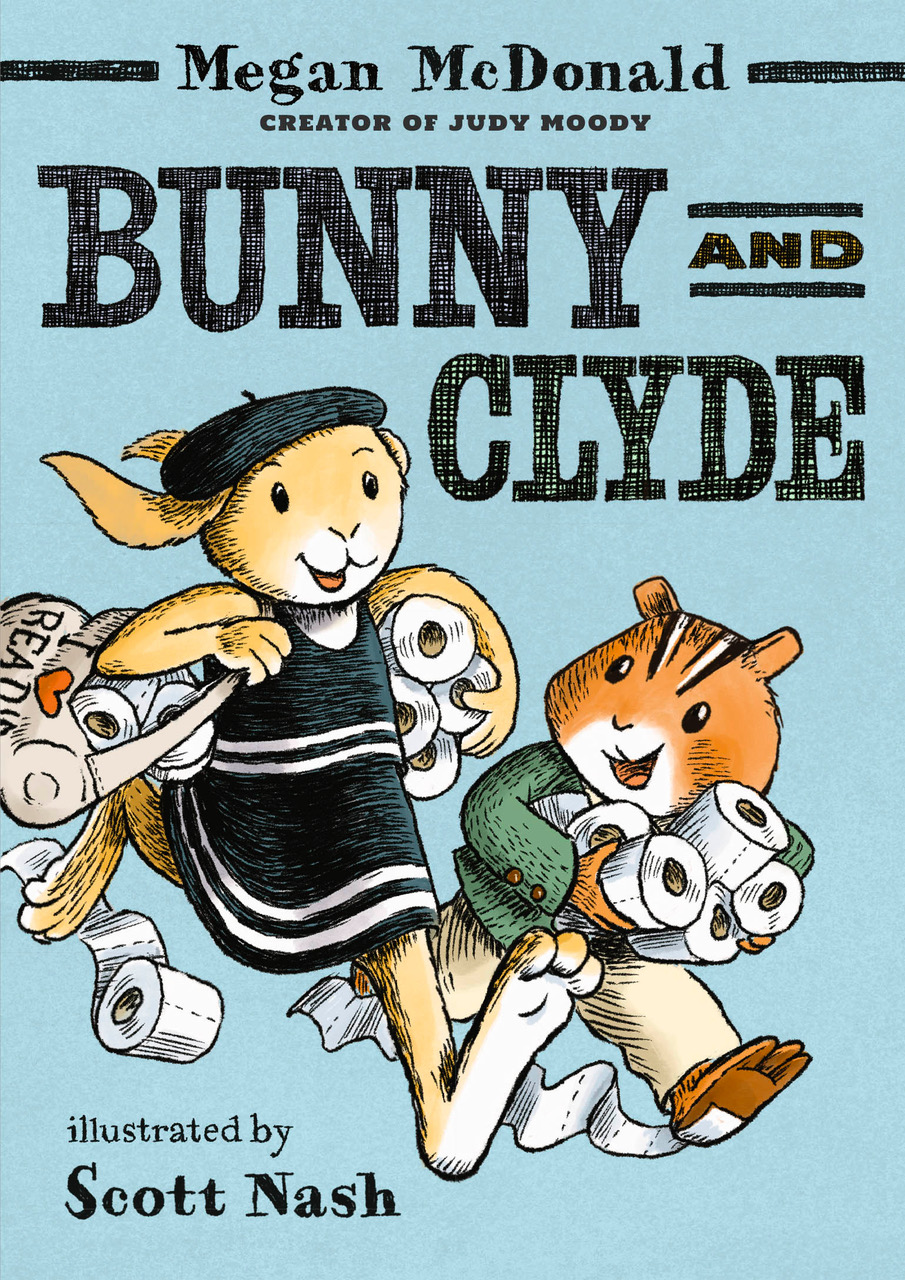 |
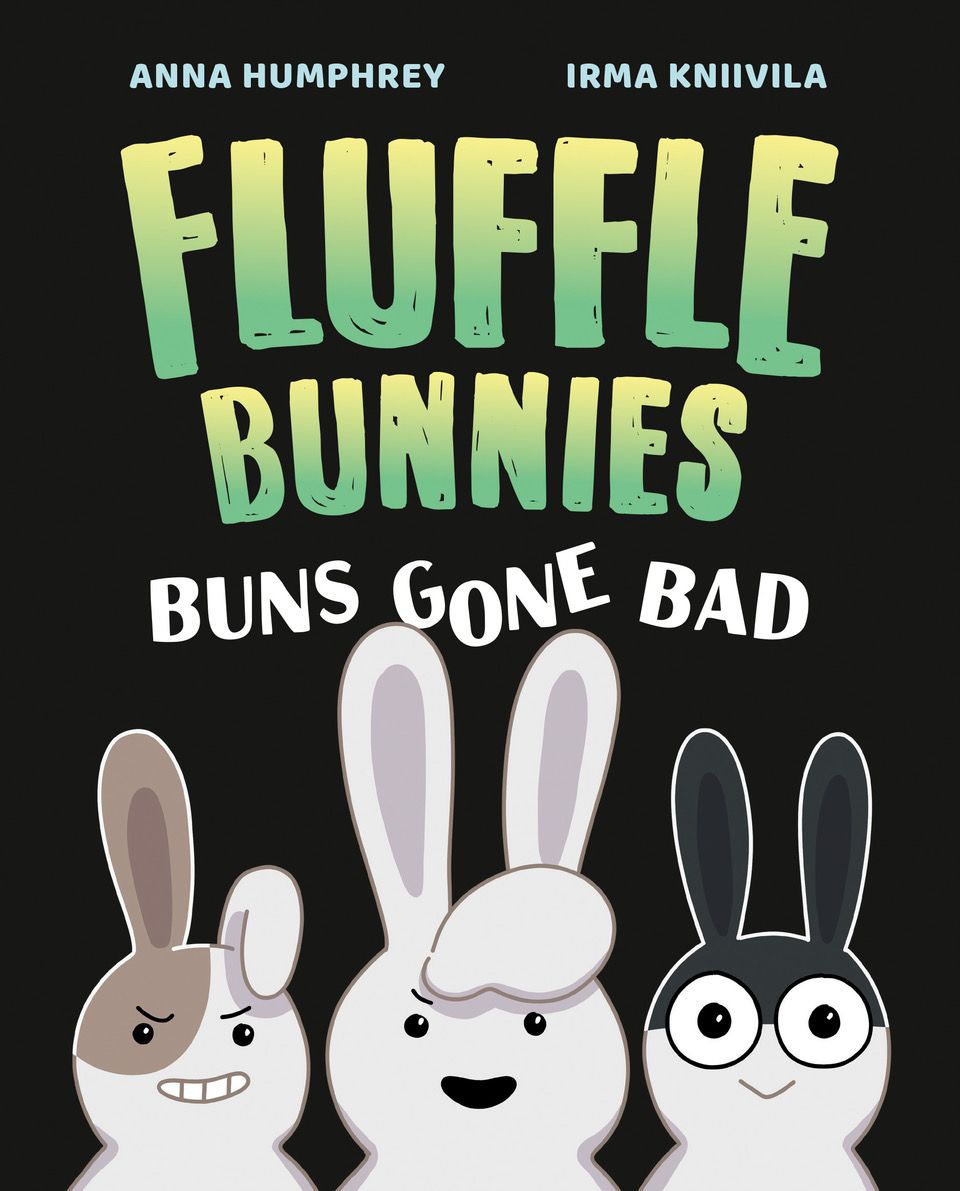 |
Megan McDonald is the author of the popular Judy Moody and Stink series and has written many other chapter books and picture books for children. She lives in California. Bunny and Clyde was published by Candlewick in March 2024.
Anna Humphrey is the author of the Megabat and Clara Humble series. She lives in a big, old brick house in Kitchener, Ontario. Fluffle Bunnies: Buns Gone Bad was published May 2024 by Tundra Books.
Here, McDonald and Humphrey discuss writing mischief for kids, the excitement of working with artists who understand the vision, and historical bad bunnies.
Megan McDonald: When I read Fluffle Bunnies, I knew we were going to be friends! Why did you want to write about bad bunnies?
Anna Humphrey: A few years ago, my son came running to tell me he'd found a secret nest of baby bunnies. We live across from an elementary school, and the mother rabbit decided to have her babies at the base of a "bus loading zone" sign. "Kind of a poor choice, Mama," I thought, but then I did some research.
It turns out mother rabbits aren't exactly the nurturing types. They nurse their babies twice a day, but the rest of the time they stay far away from the nest to avoid attracting predators. Then I wondered if maybe this Mama was on to something! She hid her babies in plain sight where almost nobody saw them. CUNNING! Then she tough-loved them into learning how to fend for themselves. Almost like she was preparing them to be bunnies who could take on the world--perhaps even take it over? And that's how the Fluffle Bunnies began.
McDonald: So, it's true, then, that a Mama bunny might run off to Brazil to become a jujitsu master.
Humphrey: It is! But tell me all about how Bunny and Clyde came to be--I am dying to know.
McDonald: Usually, my books are inspired by an experience, like yours. But in this case, it was really the names of the characters that inspired me: I scribbled "Bunny and Clyde" down on a napkin years ago. Their names, of course, are a riff on Bonnie and Clyde, who were famous bank robbers. So, I decided I wanted my characters to be bad. I think it's tantalizing for kids to read about a character who does something bad. But I thought it might be funny if they've always been good, and don't know how to be bad--so, they have to learn.
Humphrey: I love that as a concept. I was such a rule follower as a kid. What inspired you to make Clyde something other than a bunny?
McDonald: At first, I made both of my main characters bunnies. Bunny had to be a bunny, right? But then I thought it might be harder to distinguish between them, so I turned Clyde into a chipmunk. I love the visual contrast. I originally started the book by stating that there were two bad bunnies. Except one wasn't a bunny. So, then I got some humor out of people calling them bunnies and Clyde protesting that he's a chipmunk.
Bunnies are so sweet and cuddly, I think it's fun to flip the script and think of them as "bad" guys. In Bunny and Clyde, they try so hard to be bad, but everything keeps turning out good.
 |
|
| Anna Humphrey (photo: Christine Saunders) |
|
Humphrey: Agreed. There's just something so timelessly funny about a creature that's so cute behaving badly. I didn't realize before I started writing Fluffle Bunnies that bad buns are actually a tale as old as time. They even appear in the margins of medieval manuscripts! All these cute little bunnies wielding spears and chopping off heads. Obviously, my bunnies weren't going to do that... but rabbits really are big-time trouble. Ask a gardener. Or any rabbit owner.
McDonald: Yes, I once had a rabbit named Nutmeg and she would escape and build nests out of clothes, pillow stuffing, shoes....
Humphrey: They are pure mischief.
McDonald: Mischief is a good word. Why did you make your bunnies bad in the ways you did?
Humphrey: After their mom hops off to become a jujitsu master in Brazil, I wanted readers to see the bunnies not just survive but thrive. But to accomplish that, they could only work with what they had. That's why whether they're outsmarting racoon goons or thwarting evil chipmunks (Sorry, Clyde!), they do it with brains, and, of course, the incredible power of their cuteness.
McDonald: I love that they are so clever and ingenious.
Humphrey: It was so much fun to watch Bunny and Clyde's bad deeds get foiled at every turn. How do you depict "bad" animals for the youngest readers without totally glamorizing a life of crime or bad behavior?
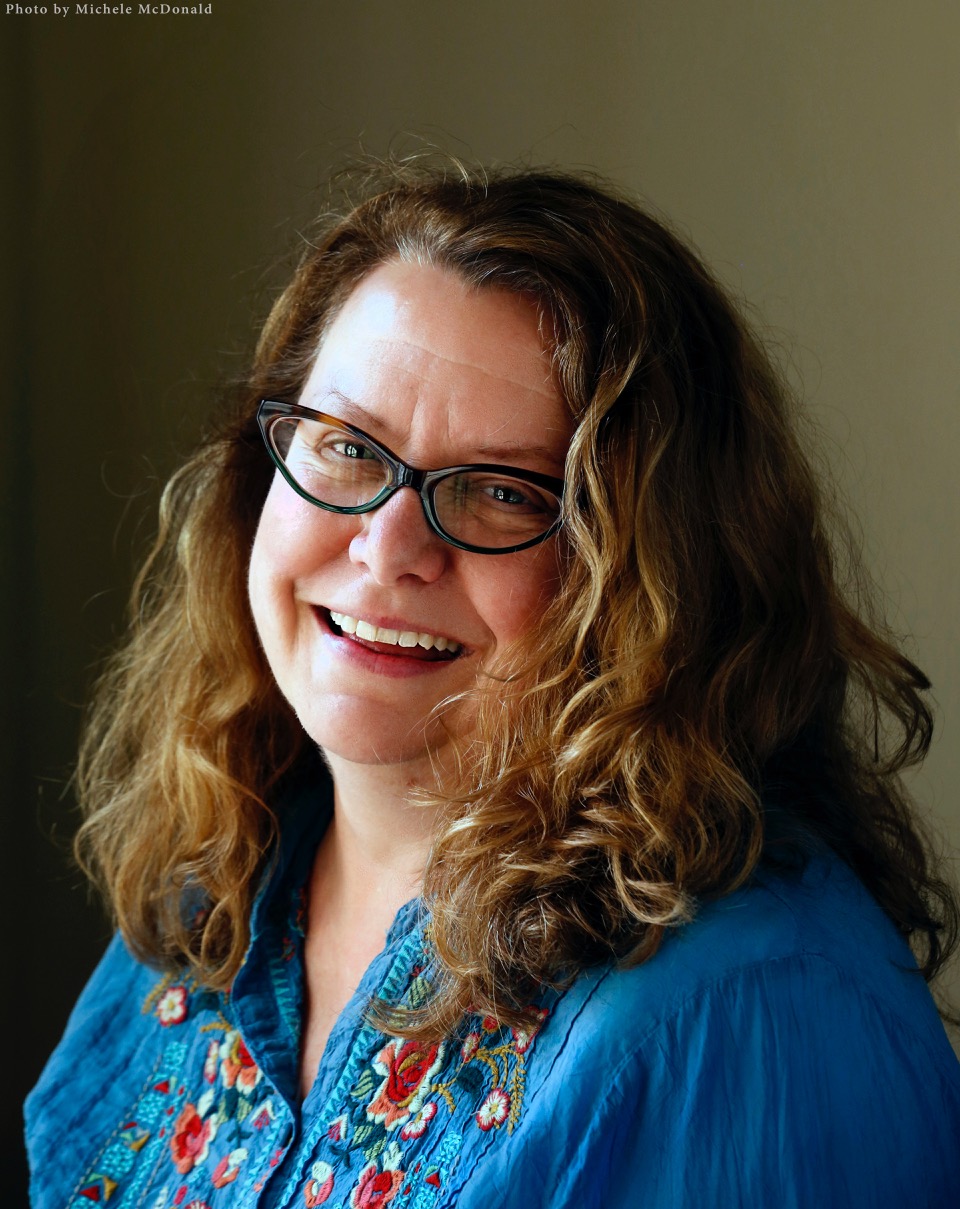 |
|
| Megan McDonald |(photo: Michele McDonald) |
|
McDonald: A lot of books about being bad or good are overly instructive and didactic. I think it's more fun if kids can see themselves in a character who has flaws and is not good all the time. Kids can relate to not always wanting to clean your room, or return your library book on time, or compost those apple cores.
In my book, I tried to get across a whiff of danger, a taste of being bad, but then it turns out that crime doesn't pay. Hey, I think I just thought of the next adventure: Bunny and Clyde: Crime Doesn't Pay!
Humphrey: Ahhhh! So honored to be here to witness that.
I definitely found this to be a tricky balance. I don't want to be promoting badness... but there's a difference between being bad-bad and being bad in the sense that you're brash and bold. Standing up for myself is something I really struggled with as a kid, and something I'm still learning to do. I've got a thing or two left to learn from my bunnies. Biggie, Boingy, and Flop are always reaching high and looking out for numbers one, two, and three, but they're never malicious. If another character feels their adorable wrath, you can bet they did something to deserve it.
McDonald: I agree, it is a tricky balance, and I think adults worry about promoting something that we deem as "bad" behavior. But kids accept and laugh at it. Maybe it goes back to your word: mischief. A little mischief is not a bad thing.
Humphrey: I'm a big fan of shenanigans.
McDonald: Another great word! When I read Bunny and Clyde aloud to a class of third graders, they kept shouting out, "They're good! No, they're bad! They're good again!" They seemed to delight in recognizing and anticipating what might be thought of as bad behavior.
Your book is so funny, and the humor is enhanced by the visuals. How did you convey your humor to the illustrator?
Humphrey: Writing a graphic novel turned out to be a lot like writing a play with stage directions and character descriptions. I tried my best to convey the ridiculousness going on in my head, and thankfully Irma Kniivila didn't need much help ramping up the humor. She's naturally ridiculous (and I mean that in the best way possible)! Her take on the buns delighted me--I feel so lucky to work with her.
McDonald: It's exciting when the illustrator adds so much to the work. Scott Nash, the illustrator of Bunny and Clyde, thought of the WANTED poster, for example.
So, might there be another Fluffle Bunnies in our future?
Humphrey: There will. Working title is Big City Buns. How about Bunny and Clyde?
McDonald: Book two is also in the works: Bunny and Clyde: On the Lam.
This has been so much fun. I hope we both get up to some shenanigans in the future!
Anna: Definitely! Mischief and mayhem await.
Book Candy
Book Candy
Harry Potter and the Philosopher's Stone artwork sells for record £1.5 million (about $1.9 million), the Guardian reported.
---
In early September, the New-York Historical Society museum will open a special installation celebrating the 50th anniversary of the publication of Robert A. Caro's The Power Broker.
---
Design Taxi highlighted "a dollhouse that shifts into an elegant bookshelf when you want it to."
Rediscover
Rediscover: Kinky Friedman
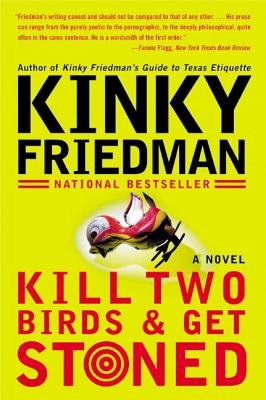 Kinky Friedman, a singer, songwriter, humorist, and sometime politician who "developed an ardent following among alt-country music fans... and whose biting cultural commentary earned him comparisons with Will Rogers and Mark Twain," died June 27 at age 79, the New York Times reported. Friedman wrote 18 books, including novels and essays, eventually selling more than six million copies in the U.S. and in Europe.
Kinky Friedman, a singer, songwriter, humorist, and sometime politician who "developed an ardent following among alt-country music fans... and whose biting cultural commentary earned him comparisons with Will Rogers and Mark Twain," died June 27 at age 79, the New York Times reported. Friedman wrote 18 books, including novels and essays, eventually selling more than six million copies in the U.S. and in Europe.
In the 1980s, Friedman began writing detective novels, "using the same casual irreverence that he brought to the stage in books like Kill Two Birds and Get Stoned (2001) and God Bless John Wayne (1995)," the Times noted. He also wrote a column for Texas Monthly in the 2000s, "letting his freak flag fly with articles about politics, music and life in rural Texas."
Observing "a surprising earnestness behind his weirdness," the Times wrote that Friedman founded a ranch for rescue animals. He and his sister, Marcie, ran Echo Hill Camp, which they inherited from their parents and which they offered, free of charge, to children of parents killed while serving in the U.S. military.
"The Kinkster was a persona," writer and friend Larry Sloman said. "Richard was one of the most sensitive, warmhearted people in the world."
"Most of his fiction, starting with the 1986 novel Greenwich Killing Time, offered an even more gonzo version of his own life, built around a private detective from Texas, also named Kinky Friedman, who solved oddball crimes around New York," the Times noted. Other titles include Elvis, Jesus and Coca-Cola and The Love Song of J. Edgar Hoover.
Read what writers are saying about their upcoming titles


